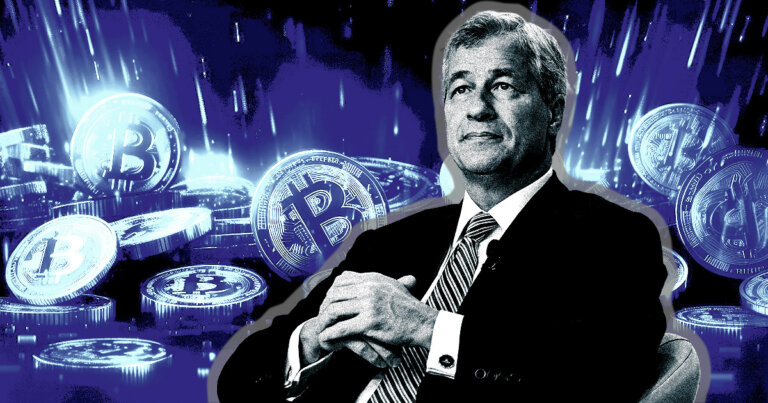 JPM’s Jamie Dimon believes Satoshi Nakamoto will either increase or “erase” Bitcoin supply
JPM’s Jamie Dimon believes Satoshi Nakamoto will either increase or “erase” Bitcoin supply JPM’s Jamie Dimon believes Satoshi Nakamoto will either increase or “erase” Bitcoin supply
The JPMorgan CEO's unfounded theories on Bitcoin have attracted massive backlash.

Cover art/illustration via CryptoSlate. Image includes combined content which may include AI-generated content.
Jamie Dimon, the CEO of JPMorgan, took aim at Bitcoin once again during an interview with CNBC at Davos 2024 on Jan. 17.
Dimon expressed an unusual theory in which he suggested that Bitcoin (BTC) could be eliminated once its maximum supply is issued. He said:
“I think there’s a good chance that … when we get to that 21 million Bitcoins, [Satoshi Nakamato] is going to come on there, laugh hysterically, go quiet, and all Bitcoin is going to be erased.”
Dimon also suggested that, contrary to this, there is no guarantee that Bitcoin issuance will end once the circulating supply reaches 21 million BTC. He said:
“How the hell do you know that it’s going to stop at 21 [million]? I’ve never met one person who told me that they know for a fact.”
One of Dimon’s co-panellists, CNBC Squawk Box host Joe Kernen, noted that the last Bitcoin will not be mined until about 2140 due to increasing mining difficulty. Kernen added that Bitcoin shares many economic properties with gold, to which Dimon replied, “You may be right … [but] I don’t own gold either.”
Dimon’s latest statements have attracted massive backlash on social media, both due to the general inaccuracy of his theories and due to the fact that he mispronounced the first half of Satoshi Nakamoto as “Satashi.”
Bitcoin mining rules are unlikely to change
Dimon’s theories are unfounded because Satoshi Nakamoto created Bitcoin but does not have control over the blockchain or its miners.
Bitcoin’s 21 million maximum supply is currently hard-coded into its source code. Any change to that rule requires agreement among miners, who are unlikely to adjust the rule due to their vested interest in the current model.
Furthermore, any change with less than unanimous support would cause the Bitcoin blockchain to split into two chains. To replace the main Bitcoin network and not merely create a minority chain, majority support among miners would be necessary. Bitcoin Cash (BCH), notably, was created with minority support in 2017 and remains separate from Bitcoin.
Finally, the Bitcoin supply could only be destroyed if all BTC holders decided to send their funds to an irretrievable address or “burn” address. Though a substantial portion of the Bitcoin supply has already been sent to such addresses, partial burning only increases the value of BTC still in circulation.



 CoinGlass
CoinGlass 


 Farside Investors
Farside Investors 


























































































